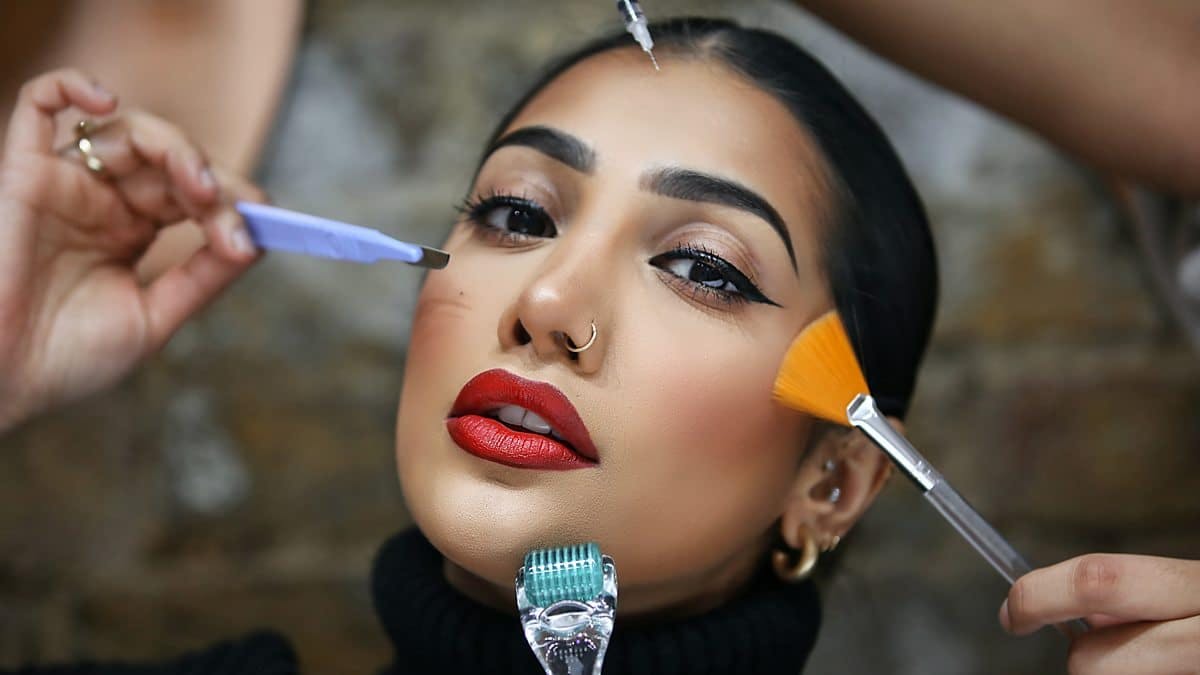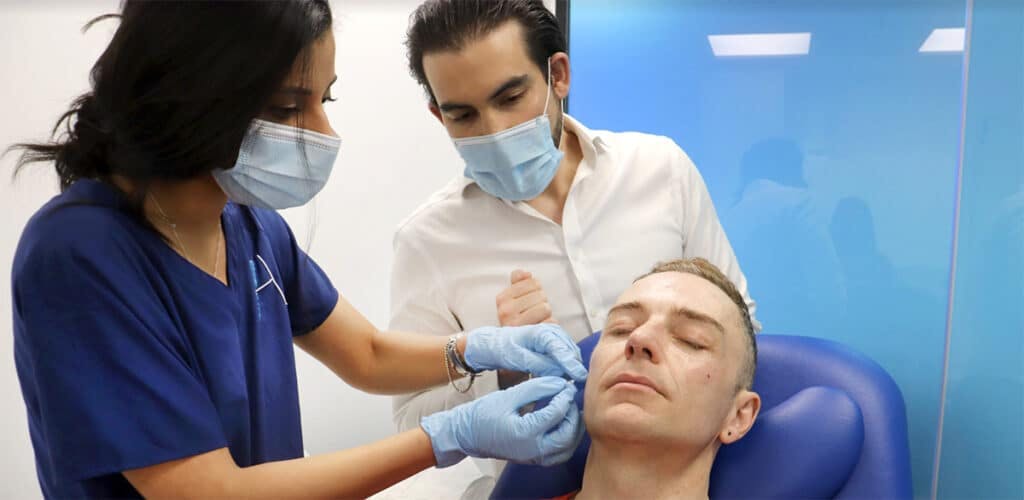Under The Skin Documentary: Our Response

A BBC Three documentary entitled Under the Skin: The Botched Beauty Business made waves in the media this week.
Released on the BBC iPlayer platform, it explores the lack of regulation of the UK aesthetics industry and includes undercover filming.
Whilst this glimpse behind the curtain of “the lay injector problem” has been greeted with shock by viewers, it is sadly unsurprising to healthcare professionals practising medical aesthetics.

Patient left with stage two necrosis
Various patients who had been treated by injectors with no medical qualifications appeared on camera to share their experiences.
A patient named Faye described how she saw a lay injector for tip lift filler in the end of her nose. She was left with mottling and stage two necrosis, two large bruised-looking circles under both her eyes during her first interview. Her injector did not recognise her complications.
“You can’t put a figure on your face… you could be disfigured for life,” she warned viewers, later underscoring that filler is “not a beauty treatment so don’t take it with a pinch of salt. It’s a medical implant and needs to be taken seriously.”
During a follow-up interview she claimed the injector who carried out the procedure was known to her and was “qualified”.
She went on to explain she now knows the UK is “the only place to have no regulations… where anybody can do a course and decide to inject someone’s face.”
A second patient who was given botulinum toxin by a non-medic injector spoke about the complications she experienced. The toxin was administered at her home which she found painful; “huge boils” full of pus that were “maybe an inch” in size appeared on her face a week later. Various other patients treated by the same injector also reported complications.
The patient, whose complications are still being investigated, felt “these companies that are offering the courses need to be shut down and she needs to go to prison”.
Teaching cosmetic injectables to non-medics
Presenter Anchal Seda undertook a 90 minute online microneedling course she saw advertised on social media. It claimed to be Ofqual regulated but this was found to be untrue.
She was astonished by the experience: “There was no mention of hygiene, no mention of sterilising equipment and no mention of needle-stick injuries. It’s really bad because you could get an infection yourself, you could infect someone else – either way, it’s not safe. I’ve spent this money and I still don’t know anything.”
Two nurses were sent on aesthetics training courses – one for thread lift training and one to learn how to administer botox – to film undercover. Continues below.
Five hours of online training had to be completed before the in-person thread lift training. Footage from this showed models in unhygienic situations being injected while their faces bled and the instructor vaping. Various medical commentators agreed it was “barbaric”.
The training provider was found to be operating illegally as it was not registered with the Care Quality Commission (CQC).
The botulinum toxin training course didn’t fare much better. Complications weren’t covered fully here either. Additionally, the medical commentator felt the prescribing doctor involved “should be struck off”. This was for the illegal act of charging to provide prescription only medications – botulinum toxin – without seeing the patient. A face-to-face consultation is required by law. The trainer later told the BBC that this was a remote prescribing arrangement due to the pandemic.
“This is posing a huge risk to the public,” said Dr Vincent Wong, an aesthetics doctor who also teaches medics and non-medics how to deal with complications. He felt the need to educate lay injectors in this way because the law, as it stands, allows them to perform medical treatments. Therefore, he believes it is better that if non-medic injectors are going to practice they have a support network and at least some knowledge that could keep patients safe.
The government’s role in regulating medical aesthetics
“Going and having filler done now is like having your nails or your lashes done,” stated Faye – the patient who experienced necrosis. “It’s like it’s fashionable to be a practitioner right now – everyone wants to do it and these people are literally one day course-ing, injecting the next day and offering complicated areas such as the tear troughs or the nose.”
The half-hour programme featured a former police officer-turned-aesthetics practitioner with no medical qualifications. Understandably, she felt the issue is with some injectors being “poor professionals”, not a lack of medical knowledge or accountability to any governing body.
She claimed to have spent over £40,000 on more than 30 different aesthetics courses. However, price is often not a determining factor when it comes to quality.
The Joint Council of Cosmetic Practitioners (JCCP) – one of the organisations at the forefront of the fight for regulation – has noted on a number of occasions that many inadequate aesthetics training courses have extremely high price tags. This leads not only to a poor standard of education but also gives the student false confidence in their ability to carry out injectable treatments. Those without any medical qualifications are especially at risk of falling prey to unscrupulous training providers.
Seda said that her “mind is blown” having found out that anyone at all can go on a one-day course and become “qualified” enough to start administering cosmetic injectables.
She also highlighted how the quality of aesthetics training courses is not monitored in the UK.
These key facts are still not widely known by the public and education of aesthetics patients is long overdue.
Seda also noted that “the government isn’t even checking what is being taught.” Contributor, Dr Naya, a medically-qualified and experienced aesthetics specialist, also felt it would take “a fatality to make the government realise what a serious problem this is.”
Update (August 2022): Find out more about the latest plan to introduce licensing for aesthetics practitioners in England in our article Introduce UK Aesthetics Licensing “by July 2023”.
Response from Harley Academy executive chairman, Dr Tristan Mehta

“Under the Skin: The Botched Beauty Business highlights just how dangerous our field has become.
My top three reasons for our lack of progress in regulating the UK aesthetic medicine industry are as follows…
Lack of Data – This one is a chicken and egg scenario. Without regulation, we can’t adequately collect data on patient outcomes and complications. Therefore we cannot make the data-driven case that these treatments really do carry the at-scale risks we know they do.
Taxation – Beauty treatments are VAT-able. Medical treatments are not. Beauty is a billion pound industry so HMRC will not want to let go of that taxation, especially in the current climate.
We aren’t leading by example – A personal one for me. What chance do we have of creating a real medical professional specialty, when our colleagues are involving themselves in unethical promotions, purchasing questionable products and not committing to proper education and training themselves?
Harley Academy was built upon the core belief that top quality education is needed in order for licensed doctors, dentists, nurses and midwives to specialise in aesthetic medicine. If healthcare professionals require this level of training to provide a competent and safe level of service, how can a non-medic be expected to come anywhere close after a one day course? And often, an unregulated course of questionable quality at that.
We devised the Level 7 Diploma in Botox and Dermal Fillers and partnered with the JCCP so that healthcare professionals can access best-in-class, holistic training in medical aesthetics. This is the gold standard in aesthetic medicine qualifications and is something the public can look for when researching treatment providers.
Being Level 7 qualified shows you have been trained to be a safe and ethical injector – that you have received Master’s level training from experts in the field. It shows you have studied not just injecting techniques but also anatomy, facial ageing, skin ageing, preventing and managing complications… the list goes on.
This level of education is something that I – and everyone at Harley Academy – is incredibly passionate about. We hope this new documentary helps to educate the public about the risks associated with having non-medic injectors treat them. But more than that, we hope to see stricter rules and regulations to safeguard patients from this put in place soon.”
We highly recommend you watch the show while it is available and let us have your thoughts over on our Harley Academy Instagram page.
Under the Skin: The Botched Beauty Business, BBC Three, available on demand via BBC iPlayer.
All information correct at the time of publication.
Download our full prospectus
Browse all our injectables, dermal fillers and cosmetic dermatology courses in one document
By submitting this form, you agree to receive marketing about our products, events, promotions and exclusive content. Consent is not a condition of purchase, and no purchase is necessary. Message frequency varies. View our Privacy Policy and Terms & Conditions
Attend our FREE open evening
If you're not sure which course is right for you, let us help
Join us online or in-person at our free open evening to learn more
Our Partners














STAY INFORMED
Sign up to receive industry news, careers advice, special offers and information on Harley Academy courses and services

